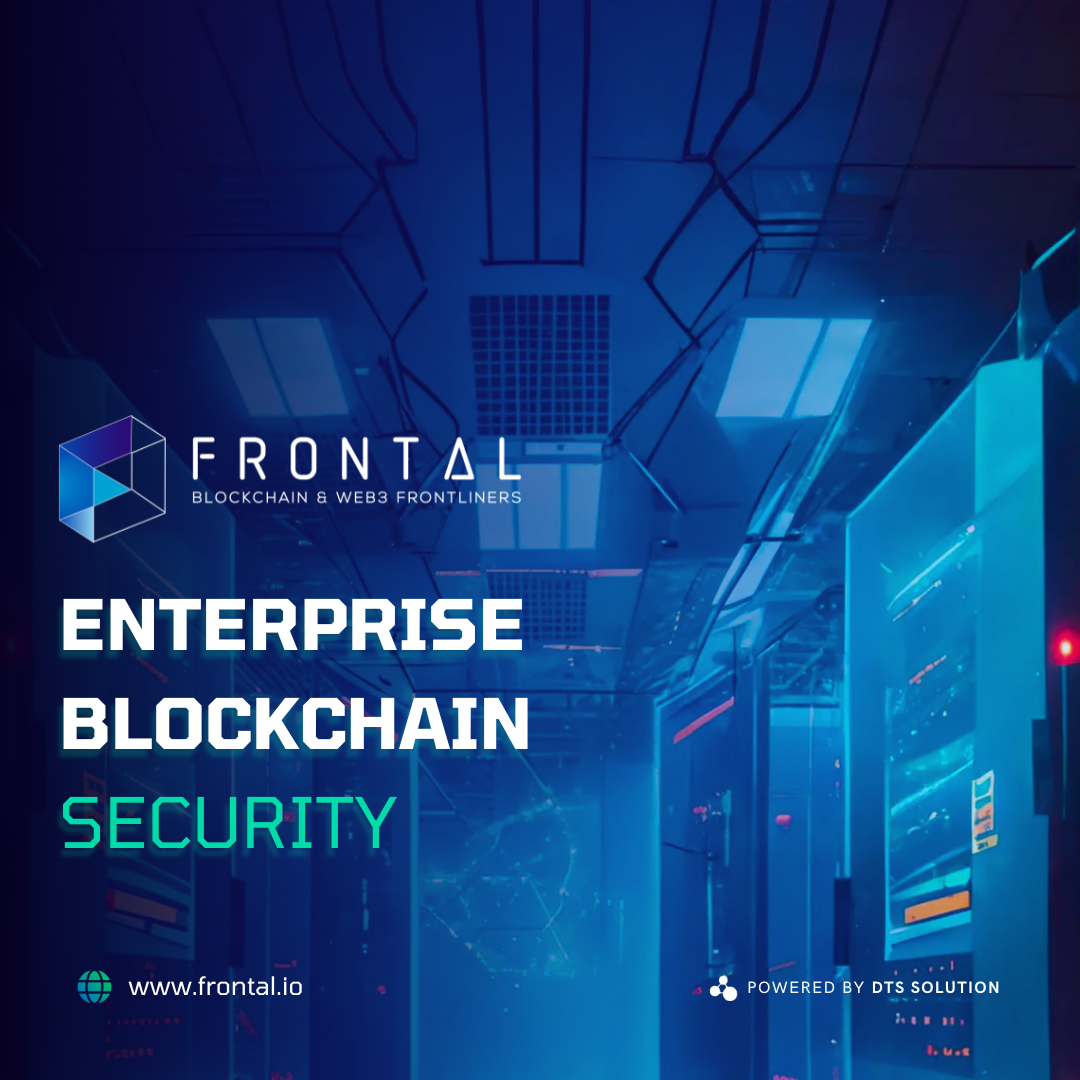Blockchain technology has become increasingly popular among major corporations, as it offers a resilient infrastructure for secure business transactions and data tracking. However, blockchain applications and infrastructure are vulnerable to attacks that can lead to unauthorized access to data, fraudulent transactions, or penetration of a corporate network. In this article, we will explore the key points of vulnerability in the enterprise blockchain landscape and provide an overview of Frontal’s Enterprise Blockchain Security solution, which helps mitigate these risks.
Key Points of Vulnerability in Enterprise Blockchain Landscape
The enterprise blockchain landscape has three key points of vulnerability: blockchain applications, smart contracts, and network infrastructure.
Blockchain applications provide access to data on the blockchain and must provide strong user authentication and authorization features. Smart contracts are sets of business logic that trigger business transactions if the required business conditions are met. Network infrastructure includes servers, databases, and network connections required to run blockchain applications.
Errors in the chaincode, security flaws in network infrastructure, and insufficient user authentication and authorization in blockchain applications can be exploited by attackers. For instance, a flaw in the chaincode could lead to data being discredited, and malicious manipulations in the chaincode could cause inconsistent behavior of nodes and unpredictable results. Additionally, endpoint security flaws could make corporate networks vulnerable to attacks.
Security Considerations
Blockchain technology offers many benefits to enterprises, but introducing new software applications and IT infrastructure can also create security risks. Smart contracts, which trigger business transactions when certain conditions are met, are a critical aspect of blockchain development. However, there are unique security considerations that developers must take into account.
For example,
-
Software applications and IT infrastructure
- Introducing new software applications and IT infrastructure can lead to risks
- Multiple network connections from parties beyond a single corporate network can compromise the integrity and business logic of the chaincode and security of the participating nodes
- Errors in the chaincode can lead to non-deterministic behavior of nodes and discredit data
- Security flaws in network infrastructure can be exploited by advanced persistent threats (APTs) in order to drain sensitive commercial data
-
Smart contracts
- Smart contracts must act as documented, behave deterministically and contain no undeclared functions
- Non-deterministic behavior of the smart contracts will produce inconsistent results in the business process
- Errors or malicious manipulations in the chaincode may cause incoherent behavior of nodes and unpredictable results, while misconfiguration may lead to data manipulation and unapproved transactions
-
Retail companies
- Using chaincode and multiple network connections from parties beyond a single corporate network can compromise the integrity and business logic of the chaincode and security of the participating nodes
- Errors in the chaincode can lead to non-deterministic behavior of nodes and discredit data
- Security flaws in network infrastructure can be exploited by advanced persistent threats (APTs) in order to drain sensitive commercial data
-
Shipping companies
- Unauthorized access to data via the blockchain applications may result in data manipulations and compromise several entities
- Non-deterministic behavior of the smart contracts will produce inconsistent results in the business process
- Endpoint security flaws can make the corporate networks of the participating parties vulnerable to attacks
-
Financial organizations
- Insufficient user authentication in blockchain applications may lead to unauthorized financial transactions
- Errors or malicious manipulations in the chaincode may cause incoherent behavior of nodes and unpredictable results, while misconfiguration may lead to data manipulation and unapproved transactions
Mitigating Risks of Attacks on Blockchain Applications and Infrastructure
To mitigate the risks of attacks on blockchain applications and infrastructure, companies must introduce new software applications and IT infrastructure. Frontal’s Enterprise Blockchain Security solution offers a security assessment of blockchain applications, smart contracts, and infrastructure. The service includes:
- Blockchain Application Security Assessment: This assessment focuses on identifying security vulnerabilities within the blockchain application layer. It looks at how users authenticate and authorize themselves within the application, as well as any security mechanisms that are in place to protect against unauthorized access. The assessment may also include a review of how user data is handled and stored within the blockchain application, to ensure that it is adequately protected.
- Smart Contract Security Assessment: Smart contracts are a key component of many blockchain applications, as they provide the business logic that underpins transactions on the network. A smart contract security assessment is designed to identify any vulnerabilities in the code that may allow an attacker to manipulate the contract’s behavior or execute unauthorized transactions. The assessment also looks for any undeclared functions within the smart contract code that could be exploited by attackers.
- Infrastructure Security Assessment: The infrastructure security assessment is focused on identifying vulnerabilities within the network infrastructure that supports the blockchain application. This includes servers, databases, and network connections, as well as any other components that may be used to store or process data on the network. The assessment may include a review of network security protocols, firewalls, and other security measures to identify potential weaknesses.
- Blockchain Security Audit: The blockchain security audit is a comprehensive review of the entire blockchain solution, including the application layer, smart contracts, and infrastructure. The audit is designed to ensure that the solution is functioning as intended, and all security features are working correctly. The audit may include vulnerability scanning, penetration testing, and other security testing measures to identify any weaknesses in the system. The audit report will provide detailed recommendations for addressing any vulnerabilities that are identified, as well as guidance on how to improve the overall security posture.
Conclusion
Blockchain technology offers unique benefits for business processes in enterprises. However, companies must be aware of the key points of vulnerability in the enterprise blockchain landscape and take measures to mitigate the risks of attacks on blockchain applications and infrastructure. Frontal’s Enterprise Blockchain Security solution provides a comprehensive approach to blockchain security, ensuring that blockchain applications, smart contracts, and infrastructure are secure and functioning as intended.

